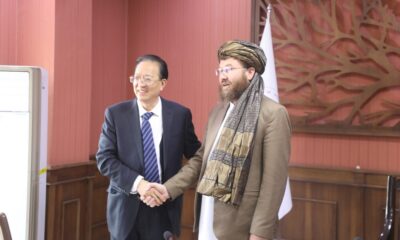Latest News
What we know and don’t know about the coronavirus

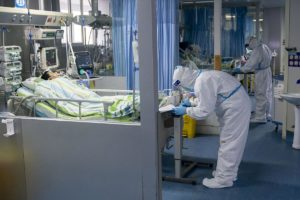 The spread of a new coronavirus in mainland China and to 27 countries and regions beyond is alarming health experts. Here is what we know – and do not know – about the virus:
The spread of a new coronavirus in mainland China and to 27 countries and regions beyond is alarming health experts. Here is what we know – and do not know – about the virus:
HOW DANGEROUS IS THE VIRUS?
The coronavirus family of viruses includes the common cold and more serious diseases such as Severe Acute Respiratory Syndrome (SARS) and Middle East Respiratory Syndrome (MERS).
Many of those with the new virus who have died had pre-existing medical conditions or were elderly, those with weakened immune systems.
Coronavirus infections have a wide range of symptoms, including fever, cough and breathing difficulties.
Statistics from China indicate that about 2% of people infected with the new virus have died, suggesting it may be deadlier than seasonal flu but less deadly than SARS, which killed about 10% of infected individuals. The MERS outbreak in 2012 had a fatality rate of about 35%.
Scientists have labeled the new virus 2019-nCoV.
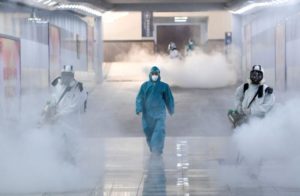 HOW IS IT TRANSMITTED AND HOW CAN IT BE PREVENTED?
HOW IS IT TRANSMITTED AND HOW CAN IT BE PREVENTED?
The virus can be transmitted via droplets when an infected person breathes out, coughs or sneezes, and can also spread via contaminated surfaces such as door handles.
Experts have said it is more easily transmitted than the SARS virus. The incubation period is up to 14 days. People may be able to infect others before symptoms appear.
The World Health Organization (WHO) recommends that people frequently wash hands, cover mouth and nose when sneezing or coughing, and avoid close contact with those who are sick.
DO FACE MASKS HELP?
“We recommend the use of masks for people who have symptoms … because the virus transmits through droplets,” says medical expert Sylvie Briand.
But they do not guarantee protection against infection.
“For people who don’t have symptoms, the mask in fact is not useful,” Briand says.
The American Centers for Disease Control’s advice is that face masks are not required for the general public.
IS THERE ANY TREATMENT?
There is no vaccine.
Chinese scientists were able to identify the genetic sequence of the new coronavirus and shared it publicly. Scientists in Australia have developed a lab-grown version of the virus, a step toward creating a vaccine.
Drugmakers around the globe expect to begin testing experimental vaccines on humans in about three months.
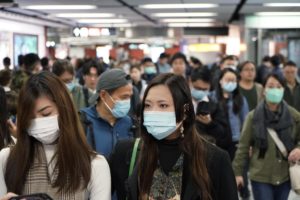 WHERE HAS IT SPREAD?
WHERE HAS IT SPREAD?
About 99% of the more than 20,000 cases have been reported in mainland China. Nearly 230 cases have been reported in about 27 other countries and regions, a Reuters tally based on official statements shows.
At least 490 people have died in China, most in and around the city of Wuhan, where the virus emerged late last year. One person has died in Hong Kong and one in the Philippines, both following visits to Wuhan.
Singapore confirmed four more coronavirus cases on Feb. 5 taking its tally to 28. Thailand has 25 cases.
It took the new coronavirus 48 days to infect the first1,000 people. It took SARS 130 days to infect 1,000 people. It took MERS 2.5 years to infect 1,000 people.
WHAT ARE AUTHORITIES DOING?
The Chinese government has virtually locked down the central province of Hubei, home to 60 million people, and its capital Wuhan.
China is facing mounting isolation as airlines suspend flights to its cities.
The United States and Australia have banned entry to foreign nationals who have recently traveled to China.
Many countries have evacuated their citizens from Hubei and are putting them in quarantine or isolation upon return.
The WHO has not recommended travel or trade curbs with China.
WHERE DID THE VIRUS COME FROM?
It is believed to have originated in a food market in Wuhan that was illegally selling wildlife. Health experts think it may have originated in bats and then passed to humans, possibly via another species.
Source: Reuters
Latest News
China keen to invest in Afghanistan’s agriculture sector: Ministry
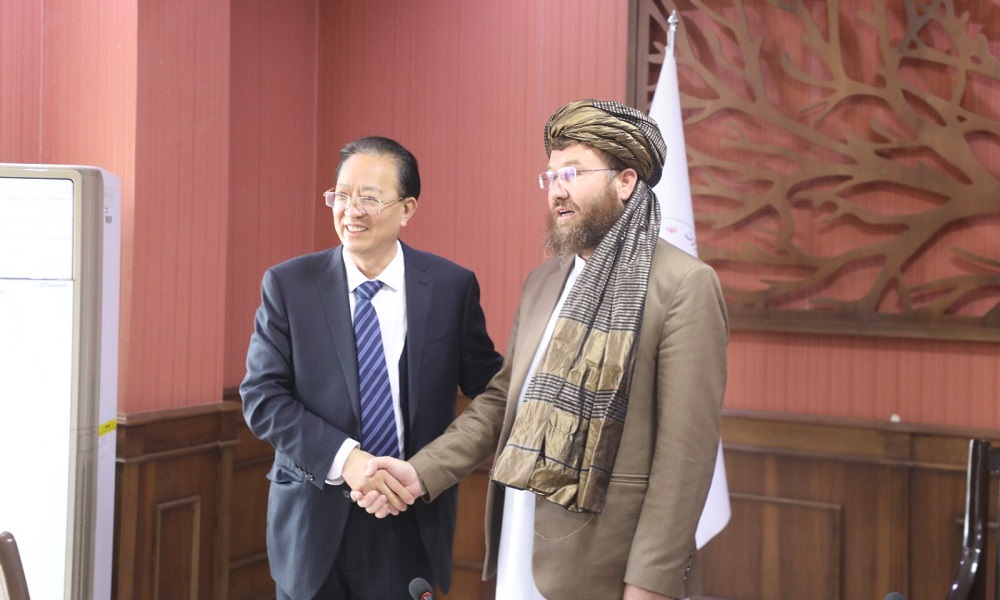
Acting Minister of Agriculture, Irrigation and Livestock, Attaullah Omari, on Tuesday met with a delegation and representatives from the Chinese private sector in Kabul and they discussed expanding cooperation, investment in agriculture, livestock, and irrigation, as well as sharing China’s experiences with Afghanistan.
In a statement, the agriculture ministry said that the Chinese delegation emphasized the Beijing private sector’s interest in investing in Afghanistan’s agriculture and livestock sectors.
The Chinese delegation also expressed readiness to begin practical projects once certain facilities such as land leasing are arranged, the statement read.
The Chinese delegation also met with Nooruddin Azizi, the acting Minister of Industry and Commerce.
During this meeting, Azizi stated that they would provide all necessary facilities for foreign investors.
Over the past three years, most Chinese companies have shown interest in investing in Afghanistan’s mining sector. However, this marks the first time that Chinese investors are seeking to invest in the country’s agriculture sector.
Latest News
Afghanistan to showcase goods at expo as part of KazanForum

Afghanistan will showcase goods, made in the country, at the KhazanForum in Russia next month, the Russian Economic Development Ministry’s department director Pavel Kalmychek said.
“The government of Tatarstan agreed to provide a platform for an exposition of goods from Afghanistan, there will be an exposition. I am confident that it will generate a certain interest, especially in the light of the recent decisions on lifting the ban on the Taliban (Islamic Emirate),” TASS quoted him as saying.
This comes after Russia’s Supreme Court last week scratched the Islamic Emirate from its list of banned organizations.
Zamir Kabulov, Russia’s special envoy for Afghanistan, confirmed recently that a Russian-Afghan business forum will be held on the sidelines of the KazanForum.
He said Russia’s delegation would be led by Deputy Prime Minister Alexey Overchuk, while Afghanistan would be represented at a high government and business level, TASS reported.
The 16th International Economic Forum ‘Russia – Islamic World: KazanForum’ will take place on May 13-18 in Kazan.
The main theme for this year has been defined as ‘Digitalization: New Reality and Additional Opportunities for Expanding Cooperation’.
Latest News
Afghan-American appointed to lead US policy on Afghanistan
Bischoping, is her married name, which comes from her German-American husband. She was born and raised in California.

An Afghan-American attorney, Mary Kabir-Seraj Bischoping, has been named deputy assistant secretary of state for Afghanistan and will oversee Washington’s foreign policy on Afghanistan under the Bureau of South and Central Asian Affairs at the US State Department.
Previously, US engagement on Afghanistan was led by Thomas West, former Special Representative for Afghanistan, and Rina Amiri, who served as Special Envoy for Afghan Women, Girls, and Human Rights.
Bischoping, 33, is a descendant of the Barakzai royal dynasty, which ruled Afghanistan from 1823 to 1978 and is the great-granddaughter of King Amanullah Khan and Queen Soraya Tarzi. Her grandmother was Latifa Kabir Seraj, one of Afghanistan’s first female journalists.
Bischoping, is her married name, which comes from her German-American husband. She was born and raised in California.
According to a biography released by the University of Virginia, Bischoping’s family fled Afghanistan after the Soviet invasion in 1979. Her parents completed their education in Europe before settling in Southern California.
Bischoping earned her undergraduate degree in Political Science from the University of California, Los Angeles (UCLA) in 2016 and later received her Juris Doctor (JD) from the University of Virginia School of Law. She is fluent in English, Persian and German.
Following the US withdrawal from Afghanistan in 2021, Bischoping joined the Office of the Legal Adviser at the State Department. In 2023, she was appointed Senior Counsel to the U.S. House Foreign Affairs Committee, where she led Republican-led oversight investigations into the Afghanistan withdrawal and advised on regional strategy.
Prior to her Congressional role, Bischoping served as a legal adviser at the State Department, clerked for Judge Kent A. Jordan on the U.S. Court of Appeals for the Third Circuit, and worked at major law firms including Gibson, Dunn & Crutcher and Willkie Farr & Gallagher in New York.
Her appointment to this high-level diplomatic post reflects a combination of legal expertise, policy experience, and a personal understanding of Afghanistan’s complex history—positioning her to play a key role in shaping future U.S. engagement with the region.
-

 Latest News5 days ago
Latest News5 days agoAzizi and Ishaq Dar discuss bilateral issues in Islamabad
-
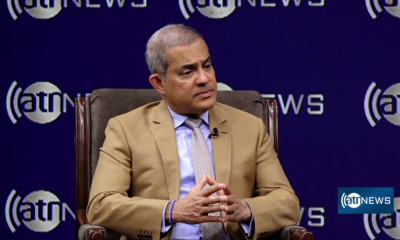
 Latest News5 days ago
Latest News5 days agoEngagement and diplomacy key to solving Afghanistan’s challenges, says Ratwatte
-

 Sport4 days ago
Sport4 days agoAfghanistan qualify for U19 Cricket World Cup 2026
-

 Regional4 days ago
Regional4 days agoDeadliest US strike in Yemen kills 74 at oil terminal, Houthis say
-
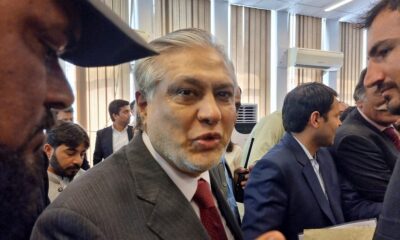
 Latest News5 days ago
Latest News5 days agoPakistan’s deputy prime minister to visit Kabul Saturday
-

 World3 days ago
World3 days agoThousands of protesters rally against Trump across US
-

 World4 days ago
World4 days agoIran, US end nuclear talks in Rome, agree to meet next week
-

 Latest News3 days ago
Latest News3 days agoPolio vaccination campaign launched in Afghanistan


